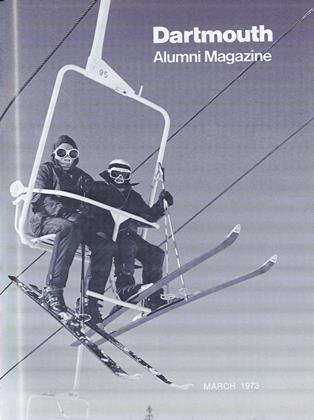THE AMERICAN CAMPAIGNS OF ROCHAMBEAU'S ARMY 1780, 1781, 1782, 1783. Vol. 1. THE JOURNALS OF CLERMONT-CREVECOEUR, VERGER, AND BERTHIER. Vol. 2. ITINERARIES AND MAPS AND VIEWS.
MARCH 1973 Louis MortonTHE AMERICAN CAMPAIGNS OF ROCHAMBEAU'S ARMY 1780, 1781, 1782, 1783. Vol. 1. THE JOURNALS OF CLERMONT-CREVECOEUR, VERGER, AND BERTHIER. Vol. 2. ITINERARIES AND MAPS AND VIEWS. Louis Morton MARCH 1973
Translated andedited by Howard C. Rice Jr. '26 and Anne S.K. Brown. Co-published by Princeton UniversityPress and Brown University Press, 1972.$100.
If the bicentennial of the American Revolution, only a few years off, follows the same course as the Civil War centennial, we can expect soon to be overwhelmed by a flood of books on our war for independence. Few of them, however, are likely to excel in interest, importance, quality of production, or price these' magnificent two volumes documenting the stay in America of the French Army under the command of the Comte de Rochambeau.
The French contribution to the success of the American struggle for independence has been frequently noted. Most Americans today are familiar with the march of Rochambeau's Army from Newport, R.I., in the spring of 1781 to join forces with Washington's Continentals on the Hudson in preparation for the march south to the York Peninsula in Virginia, where a French fleet had bottled up Cornwallis' Army. In September, the combined forces of Washington and Rochambeau reached Virginia after a rapid march from New Jersey and Pennsylvania to lay siege to the British at Yorktown. On the 19th of the month Cornwallis surrendered, bringing operations in North America to an end. After wintering in Williamsburg, the French Army marched north to Boston whence it sailed for the Caribbean in December 1782. There it fought several campaigns before returning finally to France at the end of the following year.
Howard Rice and Anne Brown have performed an invaluable service for all students of the American Revolution and of Americana in bringing together so rich a variety of materials bearing on the French experience in America. The result is virtually a feast of contemporary accounts by French officers in which they record with pen and brush their impressions of the people they met and the country through which they passed. Complementing the journals are the admirable biographies and introductions that precede them, the elaborate and scholarly notes of the editors that constitute virtually a comprehensive history of the French Army, and a checklist of journals by French officers who fought in the Revolution.
The two volumes so splendidly produced and bound must be taken together. The first is mostly text and contains the journals of three French officers: the Comte de Clermont-Crevecoeur, an artillery lieutenant; Jean-Baptiste-Antoine de Verger, an infantryman; and Louis-Alexandre Berthier, a staff officer and cartographer who later achieved fame as Napoleon's marshal and chief of staff. All three were young - Berthier at 29 was the oldest - literate and impressionable and their descriptions provide a lively and vivid picture of life in the Colonies. Illustrating the journals are sketches in full color by Verger of Indians and American uniforms, reproductions of portraits, and facsimiles of manuscripts and important documents.
The second of the two volumes consists of six itineraries, or detailed descriptions, by staff officers of the daily marches of the army; a large number of detailed and accurate maps (well over 100 in full color and 3 fold-outs) covering the route of the march and, finally, a number of color reproductions of views of Yorktown and of cities in the Caribbean. Perhaps the most important part of this volume, and of the entire work, are the beautiful maps, two-thirds of which have never been reproduced anywhere. Together they provide not only an atlas of the American campaigns of Rochambeau's Army and a testament to French military cartography, but also some of the earliest detailed maps of the area between Rhode Island and Virginia. So detailed are they - the scale of some are one-half inch to the mile - that individual houses are plainly marked.
The American Campaigns of Rochambeau'sArmy is not the first work to mark the bicentennial, but we could not have gotten off to a better start. Howard Rice, emeritus librarian for rare books and special collections at Princeton, and Anne Brown, a noted military authority and founder of the company of Military Historians, as well as the Princeton and Brown University Presses, deserve our gratitude for a work that is superlative in every respect.
Mr. Morton, Daniel Webster Professor, isChairman of the Department of History,Dartmouth College.
 View Full Issue
View Full Issue
More From This Issue
-
 Feature
FeatureSailing Dreams and Random Thoughts
March 1973 By JAMES H. OLSTAD '70 -
 Feature
FeatureNotes Towards a "Whole Life Catalog"
March 1973 By ALAN T. GAYLORD, DIRECTOR -
 Feature
FeatureTHE ACRONYM SYNDROME
March 1973 By JAMES L. FARLEY '42 -
 Feature
FeatureFACULTY WOMEN
March 1973 -
 Feature
FeatureUNDERGRADUATE JOURNAL
March 1973 -
 Article
ArticleBrautigan's Search for Reality
March 1973 By RICHARD D. CARYOLTH '73
Louis Morton
-
 Feature
FeatureWAR AND HISTORY
FEBRUARY 1963 By LOUIS MORTON -
 Books
BooksTHE GETTYSBURG CAMPAIGN, A STUDY IN COMMAND.
DECEMBER 1968 By LOUIS MORTON -
 Books
BooksMILITARISM, U.S.A.
OCTOBER 1970 By Louis Morton -
 Books
BooksTHE WAGES OF WAR 1816-1965: A STATISTICAL HANDBOOK.
MARCH 1973 By Louis Morton -
 Books
BooksJUSTICE UNDER FIRE: A STUDY OF MILITARY LAW.
July 1974 By LOUIS MORTON
Books
-
 Books
BooksALUMNI PUBLICATIONS
April, 1925 -
 Books
BooksFaculty Articles
December 1960 -
 Books
BooksMEDIEVAL MENAGERIE
March 1953 By Churchill P. Lathrop -
 Books
BooksTHE FULBRIGHT PROGRAM: A HISTORY.
APRIL 1966 By DAVID A. BALDWIN -
 Books
BooksSPEECH-MAKING
December 1938 By Dayton D. McKean. -
 Books
BooksApril Without Fear
March 1980 By Robert H. Ross ’38

